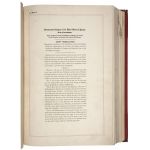Joint Resolution Proposing the Twentieth Amendment to the United States Constitution
3/4/1932
Add to Favorites:
Add all page(s) of this document to activity:

Add only page 1 to activity:
Add only page 2 to activity:
The Twentieth Amendment was ratified on January 23, 1933. It establishes when the terms of the President, Vice President, and members of Congress begin, as well as the time that Congress assembles. (A joint resolution is a formal opinion adopted by both houses of the legislative branch. A constitutional amendment must be passed as a joint resolution before it is sent to the states for ratification.)
The amendment changed the date of the presidential inauguration from March 4th to January 20th. Every inauguration from John Adams to Franklin Roosevelt’s first inauguration was carried out on March 4th (or, on a few occasions, March 5th). With elections in November, there was a long lame duck period for outgoing presidents and members of Congress.
Postponing the presidential inauguration had a purpose in a world without cars, planes, and computers. As time went on, however, four months of an inactive president ready to set their own policies became a ridiculous idea. The country and all its functions didn’t stop, but the executive branch would freeze for four months before the 20th Amendment was passed. In fact, the delayed date of inauguration soon became a burden.
The time between Abraham Lincoln’s election and inauguration—James Buchanan’s lame duck period—was also a time of severe tension between the North and the South. South Carolina seceded from the Union on December 20, 1860, and several more states soon followed. Lincoln needed to be able to deal with the crisis of a crumbling nation, but he was hampered because he was not yet President. By the time Lincoln finally took office, much of the South had succeeded from the Union.
Another example of the burden of the lame duck period can be found in FDR’s race for his first inauguration. Roosevelt was elected in November 1932 to replace Herbert Hoover and his failing economic policies during the early years of the Great Depression. But FDR could not implement his ideas until March 4, 1933. FDR had to sit on his New Deal and wait impatiently to try to save the American economy.
Now, because of the 20th Amendment, the President can begin doing their work as soon as they are elected instead of waiting impatiently to exercise their political power.
The amendment changed the date of the presidential inauguration from March 4th to January 20th. Every inauguration from John Adams to Franklin Roosevelt’s first inauguration was carried out on March 4th (or, on a few occasions, March 5th). With elections in November, there was a long lame duck period for outgoing presidents and members of Congress.
Postponing the presidential inauguration had a purpose in a world without cars, planes, and computers. As time went on, however, four months of an inactive president ready to set their own policies became a ridiculous idea. The country and all its functions didn’t stop, but the executive branch would freeze for four months before the 20th Amendment was passed. In fact, the delayed date of inauguration soon became a burden.
The time between Abraham Lincoln’s election and inauguration—James Buchanan’s lame duck period—was also a time of severe tension between the North and the South. South Carolina seceded from the Union on December 20, 1860, and several more states soon followed. Lincoln needed to be able to deal with the crisis of a crumbling nation, but he was hampered because he was not yet President. By the time Lincoln finally took office, much of the South had succeeded from the Union.
Another example of the burden of the lame duck period can be found in FDR’s race for his first inauguration. Roosevelt was elected in November 1932 to replace Herbert Hoover and his failing economic policies during the early years of the Great Depression. But FDR could not implement his ideas until March 4, 1933. FDR had to sit on his New Deal and wait impatiently to try to save the American economy.
Now, because of the 20th Amendment, the President can begin doing their work as soon as they are elected instead of waiting impatiently to exercise their political power.
This primary source comes from the General Records of the United States Government.
National Archives Identifier: 1410754
Full Citation: Joint Resolution Proposing the Twentieth Amendment to the United States Constitution; 3/4/1932; Enrolled Acts and Resolutions of Congress, 1789 - 2013; General Records of the United States Government, Record Group 11; National Archives Building, Washington, DC. [Online Version, https://www.docsteach.org/documents/document/twentieth-amendment, April 19, 2024]Rights: Public Domain, Free of Known Copyright Restrictions. Learn more on our privacy and legal page.





